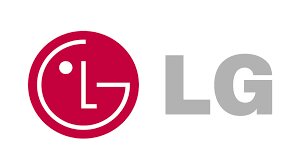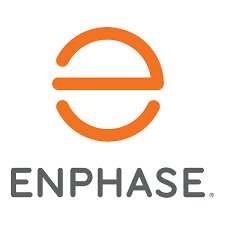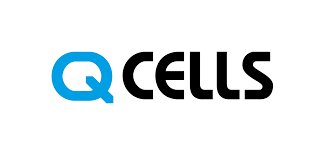Understanding Solar Energy in Houston
In Houston, solar energy is a robust and promising sector due to the city’s favorable climatic conditions and supportive energy policies.
Houston’s Sunshine Profile
Houston experiences a significant amount of sunshine year-round, making it a prime location for solar energy generation. The area averages approximately 2,500 hours of sunlight annually, translating into considerable potential for solar power production. This abundance of sunlight is harness for renewable energy, significantly reducing reliance on traditional electricity sources.
- Average annual hours of sunlight: 2,500 hours
- Peak sunlight hours: 5 to 6 hours per day
Benefits of Solar Power for Businesses
Solar power presents multiple advantages for businesses in Houston. Initially, businesses can reduce their electricity bills, as solar panels provide a portion of their electricity needs. The switch to solar is also incentivized by various tax credits, including a 30% federal solar tax credit, which can substantially lower the installation costs. Furthermore, companies that adopt solar energy can benefit from an enhanced public image, as they contribute to the sustainability and health of the local community.
- Electricity bill reduction: Cost savings over time
- 30% federal solar tax credit: Incentive for installation costs
- Public image enhancement: Commitment to sustainability
Using solar energy, Houston businesses stand to enjoy reduced operational costs in the long term while supporting renewable energy expansion, leading to a more sustainable local economy.
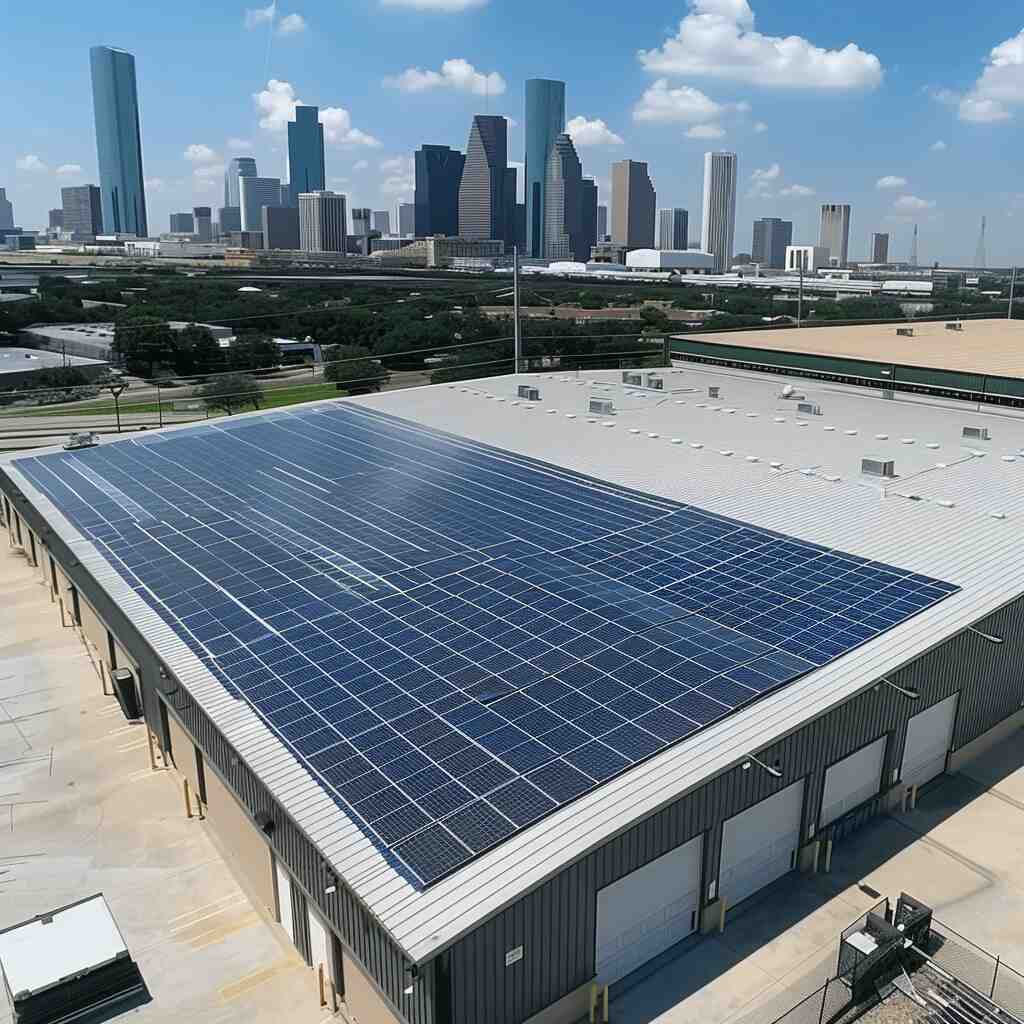
Selecting the Best Solar Panels for Your Business
When choosing the best solar panels for a business in Houston, it’s crucial to consider efficiency and the types of photovoltaic (PV) modules. These decisions will significantly impact the system’s performance and return on investment.
Factors Affecting Solar Panel Efficiency
Solar Panel Efficiency is paramount when selecting panels for a business. Efficiency determines how much of the sunlight a panel can convert into usable electricity. In Houston’s sunny climate, high-efficiency panels are particularly beneficial, leading to more power generation and potentially lower electricity bills. Factors affecting efficiency include:
- Material Quality: Higher-grade silicon results in better performance.
- Temperature Coefficient: Panels with a lower temperature coefficient perform better in warm climates like Houston.
- Shading and Roof Space: Adequate planning to limit shading and make the best use of available roof space can maximize efficiency.
It’s vital for businesses to aim for panels that exceed the industry average efficiency of 16-18%.
Types of Solar PV Modules
For businesses, the choice of solar PV modules can be broken into two main categories:
- Monocrystalline Silicon Solar Panels:
- Higher efficiency (around 20% or more).
- Best suited for limited space scenarios.
- Typically more expensive, offset by their higher efficiency.
- Polycrystalline Silicon Solar Panels:
- Lower efficiency than monocrystalline (14-16%).
- Generally less expensive, making them a cost-effective choice for larger installations.
A business must choose the PV module type that balances their space constraints, budgetary considerations, and desired energy output.
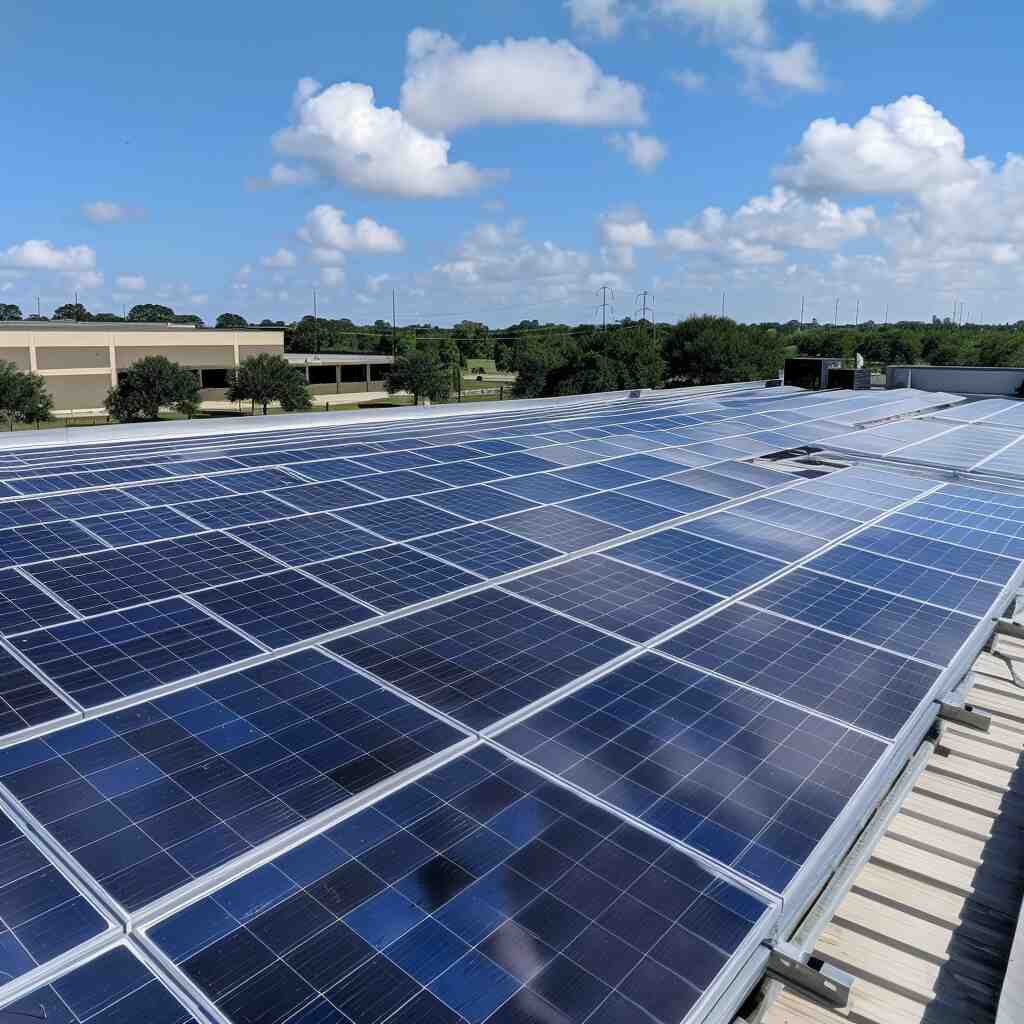
Top Solar Panel Manufacturers and Products
For businesses in Houston seeking the best commercial solar panels, several manufacturers stand out with products that combine efficiency, durability, and value.
Qcells has been acknowledged for its performance, securing the title of top solar panel brand in 2024. Their panels are known for high efficiency and substantial warranties.
Silfab Solar offers North American-made panels, focusing on quality and sustainability. Their products suit Houston’s climate, providing long-lasting solar solutions.
JA Solar is recognized for robust panels that serve large-scale installations well. They are a solid choice for Houston businesses requiring bulk solar systems with reliable output.
Panasonic, although it has outsourced manufacturing, continues to deliver panels that maintain their reputable standards. Their products are ideal for areas with space constraints.
Another manufacturer to consider is LG Solar, previously noted for top-tier panels. Despite not being listed in the 2024 snapshot, they have historically been synonymous with quality and innovation.
For the cost-conscious, a-Si thin-film solar panels are the most affordable. They feature simpler technology and suit a variety of commercial applications where space is not at a premium.
| Manufacturer | Product Highlights | Suitability |
|---|---|---|
| Qcells | High Efficiency, Leading in 2024 | Broad Commercial Applications |
| Silfab Solar | North American-made, Sustainable Products | Quality-focused Installations |
| JA Solar | Sturdy Panels, Scalable for Large Installations | Large Commercial Systems |
| Panasonic | Quality Workmanship, Good for Tight Spaces | Space-Efficient Roofs |
| LG Solar | Previous Leader, Noted for Quality (Not top in 2024) | Varied Commercial Needs |
| a-Si Thin-Film | Cost-Efficient, Simple Technology | Budget-Friendly Options |
These manufacturers provide some of the best commercial solar panels available in Houston, reflecting a convergence of industry innovation and consumer needs.
Commercial Solar Installation Process in Houston
The commercial solar installation process in Houston involves meticulous planning and adherence to specific regulations. Companies must engage with professionals for site evaluation and ensure that all installations comply with local guidelines.
Site Assessment and Design
The initial step involves a detailed site assessment by Solar Power Houston’s experts, who visit your business to gauge solar feasibility. They evaluate the roof’s structure, sun exposure, and your energy demands.
Following this, during the design phase, these professionals craft a solar power system tailored specifically to your business needs, utilizing assessment data to ensure the solar panels are both efficient and optimally positioned.
- Roof Type: Flat or pitched?
- Sunlight Analysis: Ample sun exposure identified?
- Energy Consumption: Assessment of monthly energy usage.
- System Design: Custom plan for maximum efficiency.
Following the site assessment, we draft a schematic design of the solar array to fit the building’s architecture and electrical infrastructure.
Permitting and Regulation Compliance
Houston businesses must secure the necessary permitting for commercial solar panel installation. The process involves obtaining approvals from the city’s permitting department and ensuring that the installation is in full compliance with Texas’s electrical and building codes.
- Local Permits: Acquire all necessary permits before beginning work.
- State Regulations: Adhere to Texas state guidelines for solar installations.
- Interconnection Agreements: Set up agreements with the utility company, if required.
Adherence to regulations and guidance ensures the system is safe, efficient, and legally compliant, avoiding costly penalties and delays.

Financial Considerations for Solar Investment
When businesses in Houston consider investing in solar technology, they evaluate both the initial costs and the long-term financial benefits. Understanding the total investment and potential financial returns, including tax benefits and rebates, is crucial for making an informed decision.
Cost Breakdown of Solar Installations
In Houston, as of March 2024, the average solar panel system costs are approximately $2.43 per watt, including installation. For commercial setups, which are typically larger than residential systems, the cost before incentives for a 5 kW system would average around $12,128.
- Low-end cost estimate: $10,309
- High-end cost estimate: $13,947
Commercial solar installations may vary significantly in cost based on the scale of the system, the type of solar panels used, and the complexity of the installation.
Tax Incentives and Rebates
Solar investments in Houston are subject to several financial incentives that can help reduce the overall cost.
- Federal Solar Investment Tax Credit (ITC): Businesses can claim up to 30% of their system cost as a credit on federal taxes.
In Houston, consulting with Solar Power Houston is smart for businesses interested in solar installations. The city offers property tax abatement for the added value from such installations.
Though local incentives seem scarce, a professional can help find more utility or state-specific rebates. These incentives are important for reducing initial costs and improving investment returns.
Call now to get a free quote
Solar Power Storage Solutions
For businesses in Houston, solar power storage solutions play a crucial role in maximizing the utility of solar panels. Reliable storage systems ensure that energy harnessed during peak sunlight hours is available during periods when solar generation is lower or demand is higher.
Types of Storage Solutions:
- Lead Acid Batteries: Cost-effective and well-tested, ideal for businesses that require large storage capacity and have space.
- Lithium-Ion Batteries: Known for their light weight and longer lifespan, suited for businesses looking for efficiency and a compact footprint.
- Redox Flow Batteries: They offer long-duration energy storage, making them suitable for businesses with significant power needs.
Installation and Integration Companies must ensure the correct integration of storage solutions with their existing solar power systems. Proper integration allows for seamless automation for both storing energy and deploying it when required.
Capacity and Scalability Businesses need to assess their energy consumption patterns to determine the appropriate storage capacity. Scalability is a vital factor since it gives flexibility to expand storage solutions alongside business growth.
Financial Incentives The federal solar tax credit can offset the cost up to 30% for eligible energy storage solutions, proving to be a valuable incentive for Houston businesses investing in solar power storage.
Vendor Selection When choosing a vendor for solar power storage solutions, businesses should consider:
- Reputation: Look for a provider with a track record of reliability.
- Warranty: Ensure the warranty period aligns with the expected lifespan of the storage system.
- Maintenance: Assess the level of maintenance support offered.
Businesses can enhance their solar investments and energy independence with the right power storage solutions in place.

Evaluating Solar Installers and Companies
Choosing the right solar installer for a business in Houston is crucial to ensure the investment pays off in terms of both performance and financial returns. It entails considering local expertise and the reputations of service providers.
Local vs National Providers
Houston businesses benefit from choosing a local solar installer like Solar Power Houston, with its deep understanding of Houston’s climate and permit regulations. This expertise results in systems designed for maximum solar efficiency.
Local firms, being readily available for service and maintenance, offer unmatched convenience and reliability. While national providers might have competitive prices and advanced technologies due to their size, the personalized service and local knowledge of companies like Solar Power Houston often provide superior value.
Call now to get a free quote
Customer Service and Reputation
Choosing a solar installer with excellent customer service is crucial. Businesses should prioritize companies like Solar Power Houston, known for positive customer feedback and strong BBB ratings.
Their long-standing operation, exceeding a decade, underscores their reliability, consistent service, and commitment to honoring warranties. Transparency and a positive track record are key.
| Considerations | Local Providers | National Providers |
|---|---|---|
| Expertise in local regulations | Often excellent | Varies |
| Accessibility for service | High | May vary |
| Customization for local conditions | Tailored | Standardized |
| Pricing | Competitive | Potentially lower due to scale |
| Technology | May vary | Often advanced |
Business owners must carefully evaluate installers, focusing on their experience, credentials, and the volume of completed solar projects. Solar Power Houston stands out as a reliable partner with extensive experience and a track record of professional installations across Texas, ensuring top-notch service.

Maintenance and Service Agreements
Businesses in Houston looking to maximize the function and longevity of their solar panel systems should consider the value of maintenance and service agreements. These agreements typically cover a range of services that ensure solar panels operate at peak efficiency.
Regular Maintenance: Scheduled check-ups are essential. Inspections often include cleaning panels to remove dirt and debris, which can reduce energy production. Technicians also search for and remedy any physical damages or technical faults.
Real-Time Monitoring: Some service providers offer monitoring services to detect performance issues as they occur, enabling swift action to mitigate any losses in energy production.
Service Agreements: A service agreement details the scope of maintenance operations and response times for repairs, often bringing a sense of reliability to the business owner. Many providers offer different levels of coverage, and businesses are encouraged to select a plan that aligns with their operational requirements.
| Service Features | Description |
|---|---|
| Scheduled Inspections | Proactive examination of the solar system. |
| Cleaning Services | Removal of substances that impede solar panel efficiency. |
| Damage/Technical Repair | Identification and fixing of physical or technical issues. |
| Monitoring | Continuous performance tracking to catch issues early. |
| Tailored Service Agreements | Customizable plans to match unique business needs. |
Companies should thoroughly evaluate potential service agreements to ensure they receive appropriate maintenance services while keeping within budget constraints. Engaging a reliable and experienced service provider in Houston is a crucial step towards securing a sustainable and profitable solar energy investment.
Monitoring System Performance
Effective management of solar panel systems in businesses requires comprehensive performance monitoring. This ensures systems operate at peak efficiency and any issues can be rapidly addressed.
Real-Time Data Tracking
Real-time data tracking is essential for immediate insights into a system’s operation. It involves the collection and display of vital parameters such as energy output, usage, and storage capacity.
With solutions like Sol-Ark’s Powerview Pro app, businesses in Houston can monitor these factors as they happen, allowing for prompt responses to fluctuations or system disruptions.
Performance Analysis
Performance analysis leverages the data collected to optimize the solar panel system’s productivity. Through analyzing variables like energy production, voltage, and weather conditions, businesses can identify patterns that could affect performance.
Tools by manufacturers such as Enphase offer analytics for microinverter-equipped systems, granting an in-depth understanding of each module within the array.

Frequently Asked Questions
How much does it cost to install solar panels for a business in Houston?
The cost to install solar panels in Houston, TX for a business depends on multiple factors, including the size of the system and the quality of the solar panels. Estimates for a 5 kW system range from $10,309 to $13,947 before incentives. Costs can be reduced by 30% with the federal tax credit.
What size of solar panel system is recommended for a business?
The system size recommended for a business generally depends on the business’s energy consumption patterns. A professional solar installer can assess your specific needs and provide a tailored recommendation.
Are there incentives available for businesses installing solar panels in Houston?
Yes, businesses can take advantage of the federal tax credit, which is a 30% deduction of the installation cost from federal taxes. Additionally, local incentives and rebates may also be available.
Who are the best solar panel installers in Houston?
Choosing a reputable installer like SolarPowerHoustontx.com is essential. It’s wise to compare bids from at least three companies, using platforms like EnergySage and MarketWatch to find trusted services.
Can solar panels significantly reduce business operating costs?
Solar panels can reduce operating costs by lowering monthly energy bills. The actual savings will depend on factors like system size, energy consumption, and sunlight hours in Houston.
Case Studies and Success Stories
When examining solar panel successes for Houston businesses, there are compelling examples to consider. Microsoft, though not Houston-based, stands as a powerful case study with a massive commitment to environmental sustainability. They installed a Solar PV system by Sunpower, creating an estimated annual savings of $120,000.
One can look to Haynes International and the support from solar providers like Trina Solar. They installed a substantial solar power station using high-grade, durable modules. Houston businesses can learn from Haynes’ forward-thinking investment in solar technology.
The U.S. Department of Energy offers Solar Energy Success Stories showcasing research and development that enhances the reliability and resilience of the electric grid. These findings are particularly relevant for businesses in cities like Houston, where solar investment aligns with both economic and environmental aspirations.
Lastly, REC Solar emphasizes the accessibility of clean energy and reaches sustainability goals through commercial solar projects. Houston businesses could gain insights into the benefits of adopting solar panel technology from REC Solar’s expertise and commercial success stories.
| Case Study | Solar Provider | Benefits |
|---|---|---|
| Microsoft | Sunpower | Annual savings, environmental commitment |
| Haynes International | Trina Solar | High-quality solar modules, direct investment |
| DOE Documented | Various | Grid reliability, R&D advancements |
| REC Solar Projects | REC Solar | Sustainability achievements, energy accessibility |



